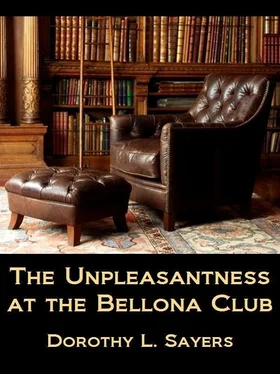“That’s the stuff,” said Hardy.
“I’m sure,” agreed Parker, pleasantly, “that you lads don’t want to get in the way, and I’ll tell you all that’s advisable. Show us a room, Captain Culyer, and I’ll send out a statement and then you’ll let us get to work.”
This was agreed, and, a suitable paragraph having been provided by Parker, the Fleet Street gang departed, bearing Wimsey away with them like a captured Sabine maiden to drink in the nearest bar, in the hope of acquiring picturesque detail.”
“But I wish you’d kept out of it, Sally,” mourned Peter.
“Oh, God,” said Salcombe, “nobody loves us. It’s a forsaken thing to be a poor bloody reporter.” He tossed a lank black lock of hair back from his forehead and wept.
* * *
Parker’s first and most obvious move was to interview Penberthy, whom he caught at Harley Street, after surgery hours.
“Now I’m not going to worry you about that certificate, doctor,” he began, pleasantly. “We’re all liable to make mistakes, and I understand that a death resulting from an over-dose of digitalin would look very like a death from heart failure.”
“It would be a death from heart failure,” corrected the doctor, patiently
Doctors are weary of explaining that heart-failure is not a specific disease, like mumps or housemaid’s knee. It is this incompatibility of outlook between the medical and the lay mind which involves counsel and medical witnesses in a fog of misunderstanding and mutual irritation.
“Just so,” said Parker. “Now, General Fentiman had got heart disease already, hadn’t he? Is digitalin a thing one takes for heart disease? ”
“Yes; in certain forms of heart disease, digitalin is a very valuable stimulant.”
“Stimulant? I thought it was a depressant.”
“It acts as a stimulant at first; in later stages it depresses the heart’s action.”
“Oh, I see.” Parker did not see very well, since, like most people, he had a vague idea that each drug has one simple effect appropriate to it, and is, specifically, a cure for something or the other. “It first speeds up the heart and then slows it down.”
“Not exactly. It strengthens the heart’s action by retarding the beat, so that the cavities can be more completely emptied and the pressure is relieved. We give it in certain cases of valvular disease — under proper safeguards, of course.”
“Were you giving it to General Fentiman?”
“I had given it him from time to time.”
“On the afternoon of November 10th, — you remember that he came to you in consequence of a heart attack. Did you give him digitalin then?”
Dr. Penberthy appeared to hesitate painfully for a moment. Then he turned to his desk and extracted a large book.
“I had better be perfectly frank with you,” he said. “I did. When he came to me, the feebleness of the heart’s action and the extreme difficulty in breathing suggested the urgent necessity of a cardiac stimulant. I gave him a prescription containing a small quantity of digitalin to relieve this condition. Here is the prescription. I will write it out for you.”
“A small quantity?” repeated Parker.
“Quite small, combined with other drugs to counteract the depressing after-effects.”
“It was not as large as the dose afterwards found in the body?”
“Good heavens, no — nothing like. In a case like General Fentiman’s, digitalin is a drug to be administered with the greatest caution.”
“It would not be possible, I suppose for you to have made a mistake in dispensing? To have given an overdose by error?”
“That possibility occurred to me at once, but as soon as I heard Sir James Lubbock’s figures, I realised that it was quite out of the question. The dose given was enormous; nearly two grains. But, to make quite certain, I have had my supply of the drug carefully checked, and it is all accounted for.”
“Who did that for you?”
“My trained nurse. I will let you have the books and chemists’ receipts.”
“Thank you. Did your nurse make up the dose for General Fentiman?”
“Oh, no; it is a prescription I always keep by me, ready made up. If you’d like to see her, she will show it to you.”
“Thanks very much. Now, when General Fentiman came to see you, he had just had an attack. Could that have been caused by digitalin?”
You mean, had he been poisoned before he came to me? Well, of course, digitalin is rather an uncertain drug.”
“How long would a big dose like that take to act?”
“I should expect it to take effect fairly quickly. In the ordinary way it would cause sickness and vertigo. But with a powerful cardiac stimulant like digitalin, the chief danger is that any sudden movement, such as springing suddenly to one’s feet from a position of repose, is liable to cause sudden syncope and death. I should say that this was what occurred in General Fentiman’s case.”
“And that might have happened at any time after the administration of the dose?”
“Just so.”
“Well, I’m very much obliged to you, Dr. Penberthy. I will just see your nurse and take copies of the entries in your books, if I may.”
This done, Parker made his way to Portman Square, still a little hazy in his mind as to the habits of the common foxglove when applied internally — a haziness which was in no way improved by a subsequent consultation of the Materia Medica, the Pharmacopoeia Dixon Mann, Taylor, Glaister, and others of those writers who have so kindly and helpfully published their conclusions on toxicology.
Chapter XVI
Quadrille
“Mrs. Rushworth, this is Lord Peter Wimsey. Naomi, this is Lord Peter. He’s fearfully keen on glands and things, so I’ve brought him along. And Naomi, do tell me all about your news. Who is it? Do I know him?”
Mrs. Rushworth was a long, untidy woman, with long, untidy hair wound into bell-pushes over her ears. She beamed short-sightedly at Peter, “So glad to see you. So very wonderful about glands, isn’t it? Dr. Voronoff, you know, and those marvellous old sheep. Such a hope for all of us. Not that dear Walter is specially interested in rejuvenation. Perhaps life is long and difficult enough as it is, don’t you think — so full of problems of one kind and another. And the insurance companies have quite set their faces against it, or so I understand. That’s natural, isn’t it, when you come to think of it. But the effect on character is so interesting you know. Are you devoted to young criminals by any chance?”
Wimsey said that they presented a very perplexing problem.
“How very true. So perplexing. And just to think that we have been quite wrong about them all these thousands of years. Flogging and bread-and-water, you know, and Holy Communion, when what they really needed was a little bit of rabbit-gland or something to make them just as good as gold. Quite terrible, isn’t it? And all those poor freaks in sideshows, too — dwarfs and giants, you know — all pineal or pituitary, and they come right again. Though I daresay they make a great deal more money as they are, which throws such a distressing light on unemployment, does it not?”
Wimsey said that everything had the defects of its qualities.
“Yes, indeed,” agreed Mrs Rushworth. “But I think it is so infinitely more heartening to look at it from the opposite point of view. Everything has the qualities of its defects, too, has it not? It is so important to see these things in their true light. It will be such a joy for Naomi to be able to help dear Walter in this great work. I hope you will feel eager to subscribe to the establishment of the new Clinic.”
Wimsey asked, what new Clinic.
Читать дальше












